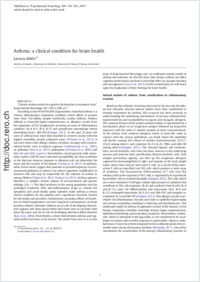Asthma: a clinical condition for brain health
- Alberi, Lavinia Institute of Anatomy, Department of Medicine, University of Fribourg, Switzerland
-
11.07.2013
Published in:
- Experimental Neurology. - 2013, vol. 248, p. 338–342
English
Commentary to “Chronic asthma results in cognitive dysfunction in immature mice” Experimental Neurology 247 (2013) 209–217According to the World Health Organization, bronchial asthma is a chronic inflammatory respiratory condition, which affects at present more than 150 million people worldwide, mostly children. Asthma defined as bronchial hyper-responsiveness to allergens results from the expansion of Th2 lymphocytes secreting an array of inflammatory cytokines (IL-4, IL-5, IL-9, IL-13 and granulocyte macrophage colony stimulating factor, GM-CSF)(Holgate, 2012). In the past 25 years the cases of asthma have more than doubled in western society with the highest morbidity around urbanized areas (D'Amato et al., 2013). It has been shown that allergic asthma correlates strongly with environmental factors such as tobacco exposure (Chilmonczyk et al., 1993), air pollution (Kim et al., 2013), pollination (D'Amato et al., 2005) and diet (Ali and Ulrik, in press). Nevertheless, recent genome wide association studies (GWAS) have indicated susceptibility loci that contribute to the aberrant immune response to allergens and can determine the onset and the severity of the disease (Tamari et al., 2013). In addition, other recent works suggest that parental or prenatal exposure to environmental pollutants as tobacco can induce epigenetic modification in immune cells and may be responsible for the endemic of asthma in young children (Salam et al., 2012 and Wang et al., 2013). Asthma appears, therefore, a complex chronic disease of environmental and genetic etiology (Fig. 1). The high incidence in the young population and the prolonged treatment with anti-inflammatory drugs to contain the symptoms and avoid deadly apnea episodes make asthma a serious clinical condition for the patients and a significant economic burden for the health care providers. Furthermore, secondary effects of breathless on blood oxygenation can have long-term consequences on brain function. Indeed, asthmatic children are at risk of developing intermittent hypoxia and sleep apnea which have been seen to correlate with lower IQ scores and are at risk of developing attention deficit disorder (Bass et al., 2004). Nevertheless, a direct link between asthma and cognitive deficit has been so far elusive. The article from Guo et al. in this issue of Experimental Neurology uses an ovalbumin animal model of asthma and indicates, for the first time, that chronic asthma can affect cognitive performance and have irreversible effect on synaptic function and neurogenesis (Guo et al., 2013). In this commentary we will touch upon the implication of their findings for brain health.
- Faculty
- Faculté des sciences et de médecine
- Department
- Médecine 3ème année
- Language
-
- English
- Classification
- Medicine
- License
-
License undefined
- Identifiers
-
- RERO DOC 209397
- DOI 10.1016/j.expneurol.2013.07.002
- Persistent URL
- https://folia.unifr.ch/unifr/documents/303449
Statistics
Document views: 163
File downloads:
- pdf: 238
